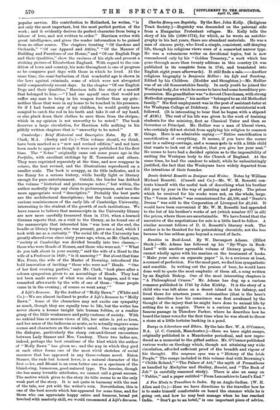Charles Henry von Bogatsky. By the Rev. John Kelly. (Religious
Tract Society.)—Bogatzky was descended on the paternal side from a Hungarian Protestant refugee. Mr. Kelly tells the story of his life (1690-1774), for which, as he wrote an autobio- graphy in his last years, there are abundant materials. He was a man of sincere piety, who lived a simple, consistent, self-denying life, though his religious views were of a somewhat narrow type. He was a voluminous writer on devotional topics, but is now remembered only by his "Golden Treasury," a work which has gone through more than twenty editions in this country (it was published in its complete form in 1746, and translated into English eight years afterwards). It still finds a sale.—Another religious biography is Benjamin Hellier: his Life and Teaching. Edited by his Children. (Hodder and Stoughton.)—Mr. Hellier was of an old Somersetshire family. In early youth he joined the Wesleyan body, for which he seems to have had some hereditary pre- possession. His grandfather was "a devout Churchman, with strong Methodist sympathies ;" his mother "belonged to an old Methodist family." His first employment was in the post of assistant-tutor at the Wesleyan College at Didabuu. Six years of ministerial work followed. (It is interesting to hear that he began with a stipend of £120.) The rest of his life was given to the work of training students for the ministry, first as Classical Tutor and then as Governor or Principal. Mr. Hellier was a man of liberal views, who certainly did not shrink from applying his religion to common things. Here is an admirable saying :—" Entire sanctification is sanctification of everything. It means, if you have the corner seat in a railway-carriage, and a woman*ets in with a little child that wants to look out of window, that you give her your seat." He seems to have had a decided opinion as to the impossibility of uniting the Wesleyan body to the Church of England. At the same time, he had the candour to admit, while he unhesitatingly justified, the fact that the Wesleyans have widely departed from the intentions of their founder.


















































 Previous page
Previous page